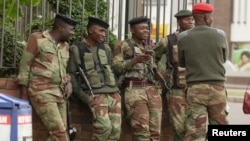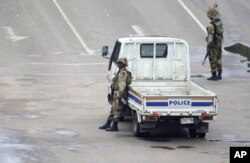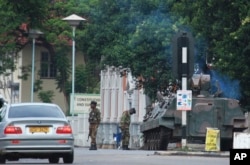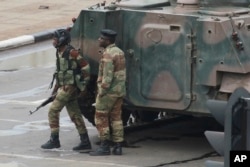A majority of Zimbabweans trust the army at least “somewhat,” though most do not want to be ruled by a military regime and do not feel free to criticize the military.
In its latest survey in the country, Afrobarometer has revealed that older Zimbabweans are considerably more likely to express trust in soldiers than their younger counterparts.
The findings indicate that three quarters (74%) of respondents aged 56 or above say they trust the army “somewhat” or “a lot,” compared to 63% of the middle-aged and 61% of the youth.
“A huge partisan divide is evident when it comes to trust in the military. A commanding majority (86%) of ZANU-PF supporters trust the army, more than double the proportion (41%) of MDC-T partisans who share similar sentiments. Among non-partisans, nearly six in 10 (57%) express trust in the army.
“Trust in the military is lower in cities (58%) than in rural areas (68%) and declines with respondents’ educational attainment: While more than three-quarters (77%) of those without formal education say they trust the army, only 52% of those with post-secondary qualifications agree.”
According to Afrobarometer, polarization of public perceptions of the military by political-party affiliation is perhaps not surprising but nonetheless striking, especially the relatively weak opposition to military rule among ZANU-PF supporters. “So is the one issue on which supporters of both major parties – and of no party – agree almost equally: that they do not feel free to criticize the military.”
A provincial breakdown reveals that majorities in all 10 provinces express trust in the army. “Interestingly, trust is both highest and lowest in the Matabeleland provinces, which experienced the deadly Gukurahundi disturbances in the first decade of Zimbabwe’s independence: 74% in Matabeleland South and only 52% in Bulawayo, with Matabeleland North at the national average of 64%.”
Compared to other state institutions, the survey indicates that popular trust in the military is relatively high – about the same as in courts of law (65%) and ahead of Parliament (55%), the Zimbabwe Electoral Commission (50%), the police (50%), and the Zimbabwe Revenue Authority (35%).
“Trust in the army does not mean freedom to criticize it, survey results show. Nearly three quarters (73%) of respondents say they feel “not very free” or “not at all free” to voice criticism of the army; fewer than one in four say they feel “somewhat free” (14%) or “completely free” (9%) to express criticism.”
Majorities in all 10 provinces in the country reject military rule, most clearly in Bulawayo, Mashonaland West, and Mashonaland Central. The least forceful rejections of military rule come from Masvingo, Matabeleland North, and Harare.
The Afrobarometer team in Zimbabwe, led by Mass Public Opinion Institute, interviewed 1,200 adult Zimbabweans between 28 January and 10 February 2017. Afrobarometer indicates that a sample of this size yields country-level results with a margin of error of +/-3% at a 95% confidence level. Previous surveys were conducted in Zimbabwe in 1999, 2004, 2005, 2009, 2010, 2012, and 2014.
The results of the survey also show that generally Zimbabweans think the army is “often” or “always” capable of protecting the country from security threats, although a majority doubt that the army gets the necessary training and equipment to make it effective.
And only half of the population think the military generally acts professional and respects the rights of citizens.
“Fear of criticizing the army is fairly consistent across most major socio-demographic groups. Respondents at the extremes of educational attainment – no formal education or post-secondary qualifications – are somewhat less likely to say they feel unfree to voice criticism than those with primary or secondary schooling. Women and youth are somewhat more reluctant to criticize the army than men or respondents above age 35 (70%-72%).
“But fear of criticizing the army knows no partisan boundaries: Only 5 percentage points separate opposition MDC-T supporters from ZANU-PF adherents. Respondents in the ZANU-PF stronghold of Mashonaland Central feel the least constrained in criticizing the army (61%), while Midlands residents feel the most unfree (88%).”
Afrobarometer is a pan-African, non-partisan research network that conducts public attitude surveys on democracy, governance, economic conditions, and related issues in African countries. Six rounds of surveys were conducted in up to 37 countries between 1999 and 2016, and Round 7 surveys are being conducted in 2016/2018.
Afrobarometer conducts face-to-face interviews in the language of the respondent’s choice with nationally representative samples.







